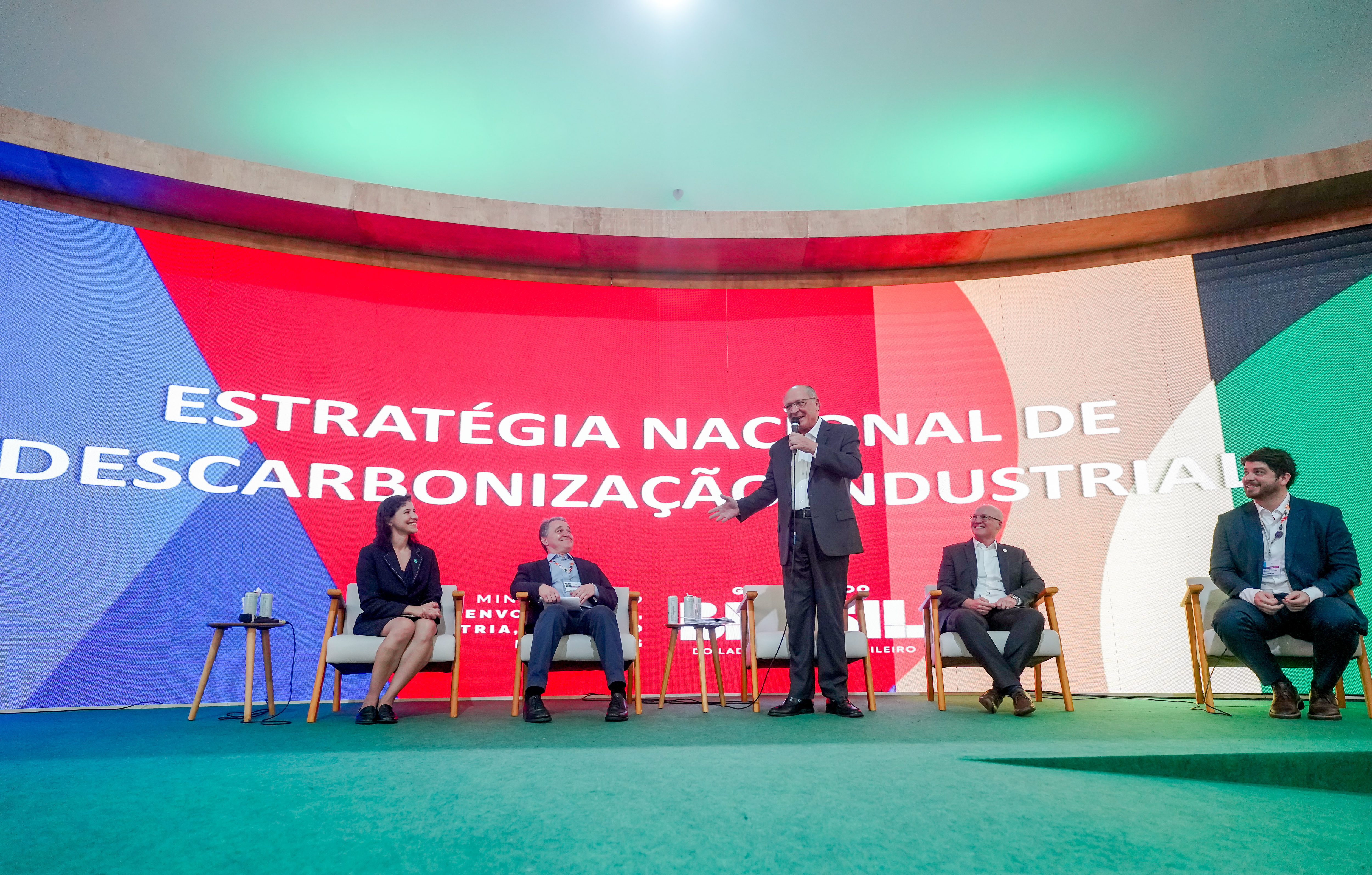Brazil’s vice president underscored the importance of decarbonization in fostering a more innovative, sustainable, and competitive industry
Geraldo Alckmin, who is also Minister of Development, Industry, Trade, and Services, attended the launch event for the public consultation on the National Industrial Decarbonization Strategy

By Rafaela Ferreira/COP30
On Monday, November 17, Brazil’s Vice President and Minister of the Ministry of Development, Industry, Trade and Services (Ministro do Desenvolvimento, Indústria, Comércio e Serviços/ MDIC), Geraldo Alckmin, launched the public consultation for the National Industrial Decarbonization Strategy (ENDI) during COP30. During the event, Alckmin stressed that decarbonization is fostering a more innovative, sustainable, and competitive Brazilian industry.
“What we are signing here today is a more innovative, sustainable, green, and more competitive industry. The environment and sustainability support the economy,” said the Vice President. “The industry of the future is low-carbon, and ENDI will strengthen national production, increasing the competitiveness of Brazilian industry in a global landscape that demands low emissions. With this strategy, once again, Brazil shows that it is in a position of global leadership when we talk about sustainability.”
ENDI is a Brazilian government strategy, coordinated by MDIC, that uses industrial decarbonization as a driver of sustainable economic development. The public consultation can be accessed on the Brasil Participativo and will remain open for contributions until January 17, 2026.
COP30 High-Level Champion for Climate Action, Dan Ioschpe, stated that the launch of the public consultation is an invitation to action. “Implementation will be guided by concrete plans, partnerships, and investments that accelerate solutions in key sectors such as energy, transport, steel, cement, chemicals, and new materials. The leadership of Brazil’s industrial sector is present and ready to show that it is possible to grow while reducing emissions.”
“That is what the COP30 Action Agenda represents: connecting governments to non-state actors to ensure that what is agreed upon in negotiation rooms is implemented in practice. More renewable energy, resilient infrastructure, and financing flowing where it is most needed,” pointed out Dan Ioschpe.
Climate neutrality
The consultation aims to enhance Brazil’s comparative advantage in industrial emissions; decarbonize existing industry by modernizing processes and substituting carbon-intensive inputs; and create green industrial chains based on bio-based inputs, biogenic carbon, and strategic minerals.
The initiative intends to increase demand for sustainable inputs and products; stimulate sustainable technologies and supply chains; strengthen industrial competitiveness and innovation; and promote enabling conditions for decarbonization, contributing to Brazil’s climate neutrality by 2050 and to regional development.
Also present at the launch, the Secretary of Green Economy, Decarbonization and Bioindustry at MDIC, Ms. Julia Cruz, highlighted Brazil’s commitment to achieving climate neutrality by 2050. “This concept means balance. It means that, from an industry standpoint, we will reduce our emissions as much as possible. And whatever cannot be reduced will be removed from the atmosphere through reforestation processes and carbon capture technologies.”
She also explained how climate neutrality walks hand in hand with industrial growth. “If it is true that we need to decarbonize Brazilian industry, it is also true that this industry needs to grow. That is why decarbonization is a lever for the competitiveness of Brazilian industry. It attracts green investment, enables exports as decarbonized products do not face tariff barriers abroad, and fosters innovation in the industrial sector,” she explained.
ENDI also establishes four strategic pillars to foster multisectoral dialogue. The first is Research, Development, Innovation (R&D&I) and professional training, promoting national technological innovation and the training of a qualified workforce to support the transition. The second concerns decarbonizing inputs, proposing the substitution of fossil raw materials and energy sources with sustainable alternatives such as biomass, low-emission hydrogen, and recycled materials.
Another pillar of the initiative is stimulating demand for low-carbon products through the consolidation of sustainable markets via certifications, labels, and public procurement policies. Finally, financing and incentives include the creation of credit instruments, tax incentives, and trade defense mechanisms that ensure the viability of industrial transition.
Engagement letter

On the occasion, the President of the Federation of Industries of the State of Pará (FIEPA) and Vice President of CNI, Alex Carvalho, explained the importance of the signing. “CNI, representing Brazilian industry, will sign an engagement letter with MDIC to reaffirm our willingness to cooperate continuously in a joint effort aimed at strengthening a Brazilian industry committed to reducing carbon intensity in its processes.”
The act consolidated cooperation between the federal government and the productive sector, reinforcing the willingness of industry to contribute to reducing carbon intensity in production and to strengthening an innovative, competitive, and socially responsible industrial base — an essential condition for Brazil to meet its climate goals by 2050.
English version: Trad. Bárbara Menezes.
Proofreading by Enrique villamil.
